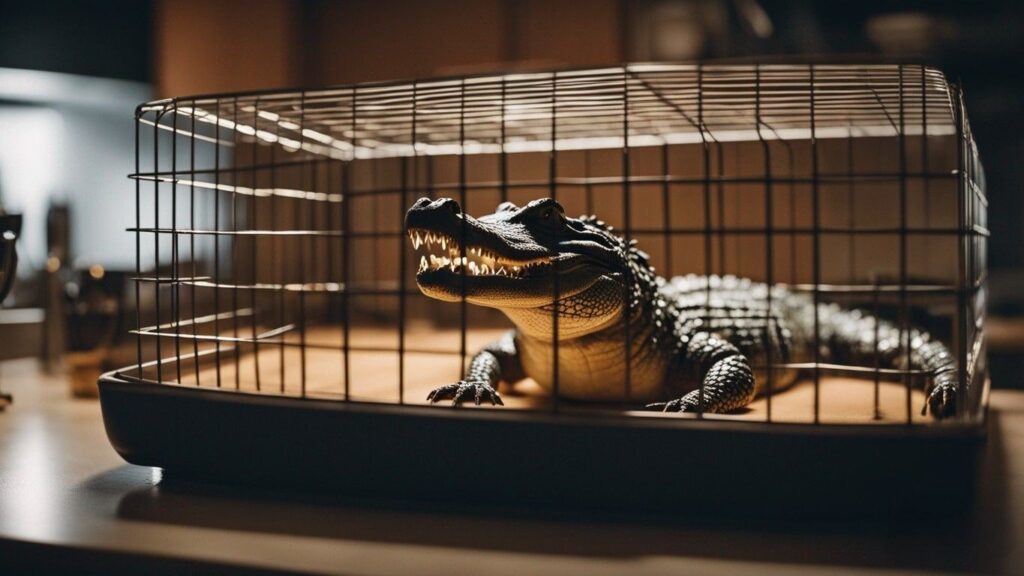So, you’ve been curious about whether owning a pet snake is legal in India? Well, here’s the lowdown: the legality of keeping pet snakes in India is a topic that often sparks interest and debate.
While snakes are a common sight in the wild across the country, the question arises when it comes to taking them in as pets.
In this article, we’ll explore the laws and regulations surrounding pet snakes in India, providing you with the information you need to navigate the sometimes slippery legal landscape of snake ownership in the country.
Get ready to shed some light on this captivating topic!

Legal Status of Pet Snakes in India
If you’re considering getting a pet snake in India, it’s crucial to understand the legal landscape surrounding these fascinating creatures. While owning a snake as a pet can be a unique and rewarding experience, it’s essential to adhere to the laws and regulations in place. In India, the legal status of pet snakes is determined by several key factors, including the Wildlife Protection Act, the Indian Penal Code, and state-specific regulations.
Wildlife Protection Act
The Wildlife Protection Act is a fundamental piece of legislation that governs the preservation, protection, and management of wildlife in India. Its primary aim is to ensure the conservation of the country’s rich biodiversity and natural heritage. When it comes to pet snakes, the act provides specific guidelines and restrictions.
Purpose of the Act
The Wildlife Protection Act was enacted to regulate activities involving wildlife to prevent their exploitation and extinction. It aims to control the possession, transportation, and trade of animals listed under Schedule I to IV of the Act. These schedules classify species based on the level of threat they face. Certain snakes, such as the Indian python and Indian cobra, fall under these schedules due to their protected status.
Restrictions on Keeping Snakes
Under the Wildlife Protection Act, it is illegal to possess or keep certain snake species without proper permits or licenses. The act prohibits the possession of any listed snake species except under certain circumstances. These exceptions include scientific research, breeding centers registered under the Central Zoo Authority, or for exhibition in recognized zoos and circuses.
Permits and Licenses
If you wish to keep a snake species listed under the Wildlife Protection Act, you must obtain the necessary permits and licenses. The process usually involves obtaining a license from the Chief Wildlife Warden of your state, who may require various documents, including a detailed application, an inspection of the enclosure, and proof of experience in handling and caring for snakes.
Indian Penal Code
In addition to the Wildlife Protection Act, the legal status of pet snakes is also governed by the Indian Penal Code (IPC). The IPC addresses criminal offenses related to snakes, including snake conservation and protection, as well as the illegal snake trade.
Snake Conservation and Protection
The Indian Penal Code includes provisions for the conservation and protection of snakes. It considers killing, injuring, or capturing protected snake species as offenses. These offenses can attract penalties, including fines and imprisonment, depending on the severity of the crime.
Illegal Snake Trade
The IPC also addresses the issue of the illegal snake trade, which poses a significant threat to native snake populations. Snakes are often captured and traded illegally for their skin, meat, or for use in traditional medicine. The IPC imposes strict penalties on individuals involved in the illegal trade of snakes, aiming to deter such activities and safeguard snake populations.
Penalties for Violation
Violating the provisions of the Wildlife Protection Act and the IPC can result in severe consequences. Offenders may face fines, imprisonment, or both, depending on the specific offense committed. It is vital to adhere to these laws to prevent harm to both snake species and the conservation efforts in place.
State Regulations
In addition to national legislation, individual states in India can implement their own regulations regarding the ownership and care of pet snakes. It is crucial to familiarize yourself with the specific laws in your state to ensure compliance.
Variances in State Laws
While the Wildlife Protection Act and the IPC provide a baseline for pet snake regulations, states have the authority to enact their own legislation. These state-specific rules may vary in terms of permitted snake species, enclosure requirements, licensing procedures, and other aspects of snake ownership. It is essential to consult the relevant state authorities or legal experts to understand the specific regulations in your area.
Specific State Requirements
Different states may have different requirements for obtaining permits and licenses for pet snakes. Some states may have specific guidelines for enclosure specifications, temperature and humidity control, and mandatory health checks for snakes. It is crucial to research and comply with all state-specific regulations to ensure you are within the legal framework.
Enforcement
Enforcement of pet snake regulations often falls under the purview of state forest departments and wildlife authorities. These departments are responsible for monitoring compliance, conducting inspections, and taking appropriate action against individuals found to be in violation of the law. It is important to cooperate with these authorities and follow their instructions to avoid legal repercussions.
Common Pet Snake Species in India
While pet snakes can be found in various species around the world, certain species are more popular as pets in India. Here are some common pet snake species you may come across:
Indian Python
The Indian python is a beautiful and majestic snake species commonly kept as a pet in India. However, due to its protected status, it is crucial to obtain the necessary permits and licenses before owning one. Indian pythons require spacious enclosures, proper temperature and humidity control, and a suitable diet to thrive in captivity.
Rat Snake
Rat snakes are another popular choice for snake enthusiasts in India. These non-venomous snakes are known for their agility and ease of maintenance. As with any pet snake, it is essential to ensure compliance with all legal requirements and provide appropriate care, including a suitable enclosure, proper feeding, and regular health check-ups.
Indian Cobra
The Indian cobra is a venomous snake species that is both fascinating and potentially dangerous. While owning an Indian cobra as a pet is not recommended for inexperienced snake keepers, those with the necessary expertise can obtain permits and licenses to keep them legally. However, it is crucial to prioritize safety and follow all legal requirements to mitigate the risks associated with venomous snakes.
Choosing a Legal Pet Snake
When considering a pet snake, it is essential to choose a species that is legal to own as a pet in your area. Here are some steps to take when selecting a legal pet snake:
Researching Local Regulations
Before deciding on a snake species, thoroughly research the regulations and laws specific to your state or region. This will help you determine which species are legal to keep and what permits, licenses, or documentation you need to obtain. Understanding the legal framework in advance will save you from potential legal issues later on.
Consulting with Experts
Seeking advice from experienced snakekeepers, herpetologists, or local wildlife authorities is crucial when considering a pet snake. These experts can provide valuable insights into the care requirements, temperament, and legality of various snake species. Their guidance will ensure you make an informed decision and choose a pet snake that is suitable for your capabilities and circumstances.
Adopting from Legal Sources
To ensure compliance with legal regulations and support conservation efforts, it is advisable to adopt a pet snake from legal sources. Reputable breeders, registered zoos, or rescues affiliated with wildlife authorities are ideal options. Adopting from these sources not only ensures you are obtaining a legal pet but also contributes to responsible snake ownership and conservation initiatives.
Requirements for Keeping Pet Snakes
Owning a pet snake comes with specific requirements to ensure the health and well-being of the snake, as well as the safety of the owner and the surrounding environment. Here are some essential considerations when it comes to keeping pet snakes:
Enclosure Specifications
Providing an appropriate enclosure is crucial for the well-being of pet snakes. The enclosure should be spacious enough for the snake to move and stretch comfortably. It should also have proper ventilation, secure locks, and escape-proof measures. Different snake species may have specific enclosure requirements, such as substrate preferences or the inclusion of hiding spots and climbing structures.
Temperature and Humidity Control
Pet snakes are ectothermic, meaning they rely on external heat sources to regulate their body temperature. It is essential to provide a temperature gradient within the enclosure, allowing the snake to choose its preferred temperature. Additionally, maintaining appropriate humidity levels is vital to mimic the snake’s natural habitat and support proper shedding.
Feeding and Healthcare
Understanding the dietary needs of your pet snake is crucial for its overall health. Different snake species have varying feeding requirements, with some preferring live prey while others can thrive on frozen/thawed rodents. It is important to research and provide a well-balanced diet to promote proper growth and nutrition.
Additionally, regular health check-ups with a qualified reptile veterinarian are recommended. These professionals can monitor the snake’s health, provide necessary vaccinations or treatments, and offer advice on proper snake care.
Licensing and Documentation
To ensure legal ownership and responsible stewardship of pet snakes, specific licensing and documentation requirements must be followed. These may vary depending on the species and local regulations. Here are some essential considerations:
Obtaining Permits
Certain snake species require permits or licenses to possess, as outlined in the Wildlife Protection Act and state-specific regulations. Obtaining these permits typically involves submitting an application, providing relevant documents, and sometimes undergoing an inspection of the enclosure and facilities. It is crucial to follow the necessary procedures to maintain compliance with the law.
Registering the Pet Snake
In addition to permits, some states may require pet snake owners to register their snakes with the local authorities or wildlife departments. This registration process helps authorities keep track of legally owned snakes and ensure their welfare.
Importing/Exporting Snakes
For individuals looking to import or export snakes, additional permits and documentation are necessary. These requirements may include obtaining an import/export license, adhering to quarantine protocols, and following international trade regulations. It is essential to consult with relevant authorities and comply with all legal obligations before engaging in such activities.
Risks and Safety Concerns
Owning a pet snake comes with specific risks and safety concerns that owners must address. While snakes can be fascinating companions, it is crucial to prioritize safety for both yourself and the snake. Here are some essential considerations:
Potential Threat to Native Wildlife
Releasing pet snakes into the wild can have detrimental effects on native wildlife populations. If a person can no longer care for their pet snake, it is essential to find it a suitable new home through legal means. Reputable rescue organizations, registered breeders, or surrender programs offered by wildlife authorities can provide a safe solution.
Handling and Safety Techniques
Proper handling techniques are crucial for both the safety of the owner and the well-being of the snake. Snakes should be approached and handled with care, ensuring minimal stress on both parties. Learning and practicing safe handling techniques can minimize the risk of bites or accidents.
Emergency Preparedness
Preparing for potential emergencies is essential when owning a pet snake. Familiarize yourself with local emergency veterinary services or reptile specialists who can provide assistance in case of snake-related incidents. It is also a good practice to have a well-stocked first-aid kit for reptiles and knowledge of basic emergency care procedures.
Final Thoughts
Owning a pet snake in India can be an enriching experience, but it is crucial to be aware of and adhere to the relevant laws and regulations.
The Wildlife Protection Act, the Indian Penal Code, and state-specific regulations all play a significant role in determining the legal status of pet snakes.
By understanding these laws, choosing legal pet snake species, and providing proper care, you can ensure a safe and enjoyable experience as you embark on your journey as a snake owner.



